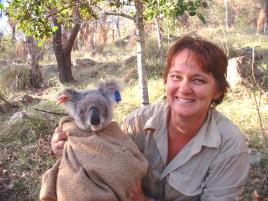Delma dedicated to koalas 'by gum!'
Published on 22 May, 2008
Spending weekends on a Whitsunday island, cuddling koalas and eating Tim Tams on top of a hill at midnight doesn't really sound like hard work.
However for the past 7 years CQU Mackay lecturer and researcher Delma Clifton has been doing exactly these things while studying the koala population on St Bees Island as part of her PhD.
The small population of 300 koalas on St Bees Island is distinct from their counterparts on Victorian and South Australian islands.
On the southern islands, the population increases rapidly, outstripping the resources and eventually the koalas die from starvation
On St Bees, this has not been the case. Delma and her team have been striving to find out what differences there are in the koalas' habitat and behaviour on St Bees Island, that might help solve the problems down south.
Delma has identified 2 weather conditions that impact on the koalas and may be crucial to explaining their distribution on the east coast of Australia.
"Night-time weather conditions affect the koala considerably since the koala is most active at night. The koala doesn't sweat - it keeps cool by panting. This is difficult in warm humid conditions such as we experience on tropical islands," said Delma.
Delma also found that more koalas tend to die during very dry conditions.
"Every 4 to 5 years, the Mackay region experiences very dry springs. Regular mortality during these periods may limit the population to a sustainable level," she said.
With the completion of her PhD, Delma will no longer be making regular trips to St Bees Island.
While her science students will miss spending weekends on the island examining these Aussie icons, Delma is planning to continue to study koalas.
"The next question is whether the koala faces the same stresses here on the mainland. I am really keen to start monitoring the remnant populations in the Mackay area," said Delma.


